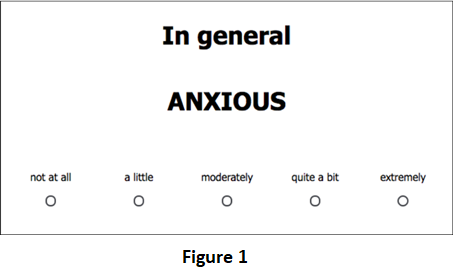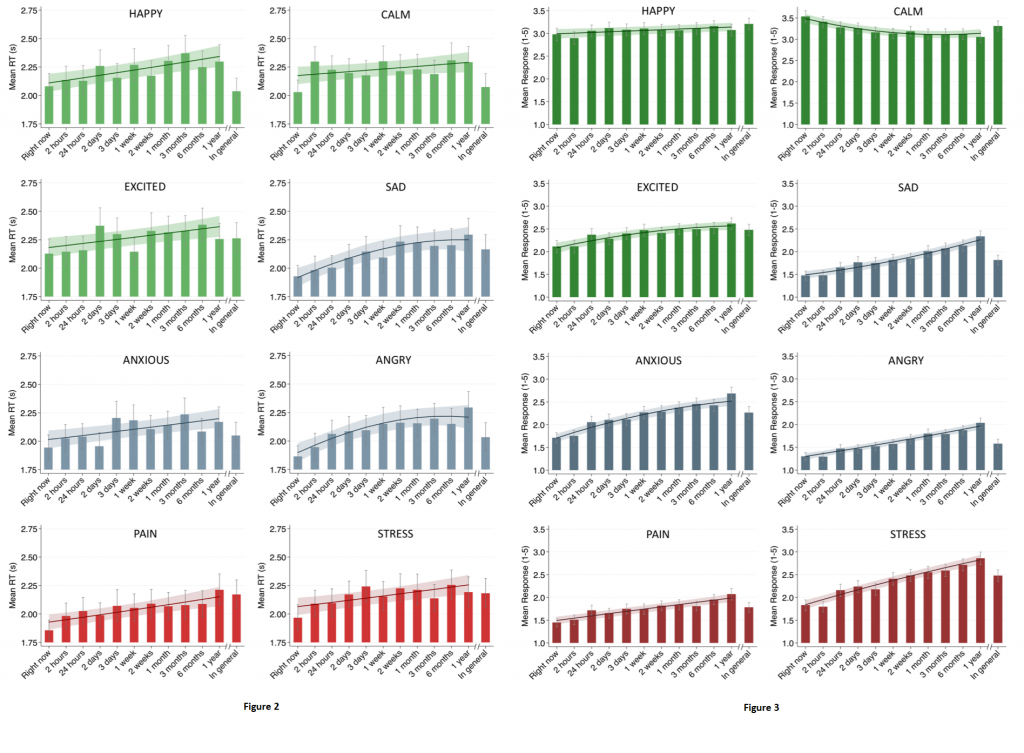How much stress did you experience in the last week/last month/last year?
This type of questions is frequently used in both research and clinical settings. Such questions require people to recall and evaluate their experiences retrospectively, over a predefined time period. But what kind of information do they rely on when deciding on an answer? It has been proposed that people use the information that is the most relevant to the current evaluation and still accessible [1]. In consequence, when responding to questions covering shorter time frames, such as yesterday or last week, we might think about particular events that happened during this time period, for example “that project meeting on Monday was really stressful”. This type of memory is called episodic. However, over time access to episodic details becomes more limited. Therefore, when reports cover longer time frames, we might rely more on our semantic memory, that is our beliefs about ourselves and the situation, for example “I live a stressful life”.
This distinction is really important for research, especially when we want to obtain an accurate estimation of people’s experiences, for example when measuring intervention outcomes. In this case, we want to minimize the extent to which people rely on their beliefs (“being a lawyer is stressful”) and increase the responses that are based on the actual experiences (“the meeting this Tuesday was a bit stressful”).
In an ideal world, we could measure all experiences as they happen in real-life. This is what we do with ecological momentary assessment at the Center for Self-Report Science at USC. However, due to practical reasons, many questionnaires remain retrospective.
In our recent paper in PlosOne [2], we wanted to detect the precise moment in which people switch from relying on episodic details to relying on beliefs. To do so, we asked 469 adults on MTurk, an online platform frequently used for research purposes, to rate how they felt (happy, excited, sad, stressed, etc.) over twelve different time frames ranging from right now to in general. We recorded both how fast they responded to the question (response time) and their responses. The example of the question is shown on Figure 1.

To find a precise moment of the memory switch, we examined the pattern of response times and response levels across the different time frames with a series of multilevel growth models. In line with previous studies [1], we assumed that the switch would be visible as a flattening of the curve for longer time frames after an initial increase observed for shorter time frames. Why is it so? If we use episodic memory, we need time to recall the relevant information to form a rating. The longer the time frame, the more time is necessary to recall all relevant details. On the other hand, when we rely on the semantic memory, we access our beliefs about ourselves and the situation. Therefore, the responses relying on this type of memory should be similar to each other, regardless of the time frame.
On the figures below we see that both response times (Fig 2) and levels (Fig 3) increased with longer time frames. However, we did not find evidence for a change in memory strategies, that is the expected flattening of the slope for longer time frames. This suggests that, even for long time frames, individuals make an effort to retrieve some episodic details about this period instead of exclusively relying on their beliefs.

Another interesting finding is the difference between the responses to “in the last year” and “in general” time frames. Sometimes it is assumed that very long time frames can be used to measure general characteristics of individuals. Our findings show that those two time frames should not be viewed as similar, as, especially for negative experiences, the ratings considering last year were higher than the ones regarding “in general”.
A take-home message from this study is that individuals use different sources of information when rating their past experiences. To increase the comparability of the results, we advise to use similar well-defined time frames across different measures within the study.
[1] Robinson, M. D. & Clore, G. L. Episodic and semantic knowledge in emotional self-report: Evidence for two judgment processes. J. Pers. Soc. Psychol. 83, 198–215 (2002).

You must be logged in to post a comment.